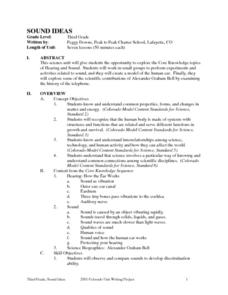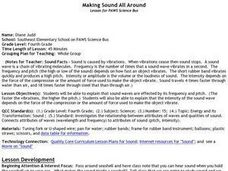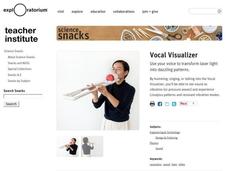Curated OER
What Does Motion Have to do with Sound?
Second graders investigate and explore sound energy. They investigate how the vibrational motion moves through matter in waves. Students describe sounds and vibrations. They observe that vibrational motion creates sounds. Students record...
It's About Time
Sounds from Vibrating Air
Take note, or notes, as the case may be. A scientific music lesson is the third in a set of eight covering waves and instruments. Scholars use straws, test tubes, and water to create various wind instruments. Then, they read...
Curated OER
What Really Matters When it Comes to Sound?
Students conduct experiments to learn about sound wave vibrations in objects and pitch. Students test how varying the volume of water in a vessel changes frequency and pitch.
Curated OER
Sound Waves
Sixth graders discover how sound is made from vibration and moves in all directions from the source in waves. They see that sound waves can be "seen" if they are translated into light. An excellent experiment is imbedded in this lesson.
K12 Reader
Waves and Currents
Waves, currents, crests, and troughs. Using information provided in an article about waves and currents, readers define terms used to describe how energy travels.
Curated OER
The Science of Sound
In this explanation of sound worksheet, students discover what sound is, how different sounds are made, frequency, how sound travels, how we hear, and a summarization. In this physical science worksheet, students answer ten comprehension...
Curated OER
Wonderful Waves
In this science instructional activity, learners perform an investigation about sound waves and vibration. Students use a pan of water and toothpicks to make and observe ripples. Learners answer 4 essay questions about their observations.
Curated OER
Building Polymer Cup Speakers
Students investigate sound waves and they build audio speakers. In this audio speakers and sound instructional activity, students explore how to make quality audio speakers. As a team they build their own speakers to have clarity in...
Museum of Science
Sound Sandwich
Not all sandwiches are tasty. Scholars use basic materials to build an instrument called a sound sandwich. They see how blowing on the instrument causes rubber bands to vibrate, which produces sound waves.
Curated OER
Sound Ideas
Complete a unit of lessons on hearing and sound. Learners conduct sound experiments, research the history of the telephone and scientific contributions of Alexander Graham Bell, and create a model of the human ear.
Curated OER
Sound and Frequency
Pupils pose their hypothesis, they ready their instruments, then record their observations. This is the science of sound lesson. They move through 5 stations, each focused on a different element of aspect of sound. Check this lesson out,...
Exploratorium
Sound Bite
Learners use their teeth for more than just eating. The activity shows class members how to send sound through their teeth by using an electric motor connected to a radio to generate vibrations. Biting on the motor...
Explore Sound
Sound and Music
What causes sound? Groups of sound detectives use a variety of tools including ping pong balls, pasta noodles, raisins, rubber mallets, and a tuning fork to investigate what causes sound. The young Sherlocks conduct a series of...
Curated OER
Strange Sounds
Students investigate sound as a form of energy. In this energy, forces, and sound lesson plan, students explore how different sounds may be made as they make a variety of materials vibrate. Students observe the effects of vibrations and...
Curated OER
Telecommunication
Each of these slides has notes for a teacher to support the activities that are planned for the students. The slides give details and facts about sound waves. Although this slide show delivers useful information about the sound waves,...
Curated OER
Making Sound All Around
Fourth graders examine how sound waves are effected by frequency and pitch. They conduct experiments using tuning forks, rubber bands, balloons, and water, and answer questions about the experiments.
Curated OER
TE Activity: Pitch and Frequency
Students experiment with a vibrating ruler and a kazoo to study the different pitches and frequencies they produce. They create both high and low pitch sound waves. They examine how engineers use sound energy when designing electronic...
Physics Classroom
Name That Harmonic: Open-End air Columns
Ever wonder what really goes on inside a clarinet? Show your young scientists the physics of open-end air columns through an easy-to-use interactive. Learners examine the features of standing waves and calculate frequency and length in a...
Curated OER
Sound Busters
Fourth graders engage in a study of sound pollution at their school. After a class discussion on what noise pollution is, learners are asked if they think there are areas of their school or community where noise pollution is a problem....
Curated OER
From Vibration to Sound
Young scholars observe a series of demonstrations to illustrate wave movement. In this sound wave lesson, students witness how objects create waves when dropped in a dish of water, use a rope and slinky to produce transverse and...
Curated OER
Tuned in: Tuning Forks and Sine waves
Learners explore the characteristics of a pure sound wave produced by a tuning fork. They use sine waves to find a curve to fit the sound wave data produced by the tuning fork. A CBL and microphone is required for this activity.
Curated OER
From Bats to Babies: Ultrasound
Students research and analyze sound waves and how an ultrasound works to image a baby in utero. They explore various websites, complete worksheets, and write a paragraph describing a demonstration they view in the classroom.
Exploratorium
Vocal Visualizer
Make sound visible with an activity that provides directions for how to build a vocal visualizer meant to create light patterns. Making noise into the visualizer causes a mirror to vibrate, reflecting a laser beam, and creating...
Teach Engineering
Acoustic Mirrors
Investigate sound waves with acoustic mirrors. Using audio software, groups make recordings of musical instruments, both with and without acoustic mirrors. They compare the recordings to see the effect of acoustic mirrors on sound...

























